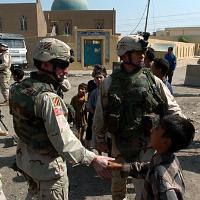What future does the United States Army face? During eight years of operations in Iraq and 10 years in Afghanistan, the Army has shifted from being a force focused on high-intensity conventional operations to one more comfortable fighting a dispersed enemy intermingled with the population. However, operations are winding down in Iraq, and an endpoint seems to be nearing in Afghanistan. Armed with the collective experience developed in the War on Terror, how will the Army move forward to face new challenges and threats? The answers involve political and military considerations that may contradict each other.
The fact that the Army lacks a clear opponent to define itself against complicates its ability to make a case for its future role. The Navy and the Air Force may face difficulties explaining their roles to a skeptical public, and they may also have problems developing a cooperative doctrinal framework, AirSea Battle, for potential hostilities with China. Nevertheless, they both seem to have an identifiable mission against a peer competitor opponent. Moreover, they both potentially have a big-picture story to tell about the role that they play in the world. The Navy acts as the guarantor of world maritime trade and American prosperity, while the global reach and global power of the Air Force serve as a deterrent to potential wrongdoers worldwide.
The Army faces a more difficult problem, because for the moment it's hard to find an enemy for it to fight. South Korean military superiority over North Korea continues to grow. While Poland and the Baltic states worry about Moscow, few think that the Russian army will threaten NATO in the near or medium term. At the same time, there appears to be little will in Washington to make a ground commitment to defending Georgia from Russian attack. Similarly, few have an appetite today for any potential invasion and occupation on the scale of Iraq. The only operations conceivable in the near future that would require both maneuver and counterinsurgency warfare involve the conquest and occupation of Iran and North Korea. Neither seems to be in the cards, and as noted, the burden of defeating and occupying North Korea would probably fall to the South Koreans.

